- Home
- Hammond Innes
The Strode Venturer Page 5
The Strode Venturer Read online
Page 5
He took my point immediately. “My dear fellow, of course. Draw on the company for all necessary expenses. I’ll fix that with Elliot; and your salary, same as you were getting in the Navy, back-dated to today as soon as Peter is on the board. That satisfy you?”
I nodded. “Can I have it in writing?”
For a moment I thought he was going to refuse, but all he said was, “Fair enough. You’ll have it in the morning and also an official letter from my brother confirming Peter Strode’s appointment to the board.” He took my arm again. “Now, come and have another drink. And then I must be off.” He led me back to the others. “Well, it’s all settled. Bailey will act as our go-between.”
Henry Strode nodded as though the issue had never been in doubt. “I don’t think you’ll have any difficulty persuading him. Just remind him that a seat on the board means four thousand a year in his pocket. As Hinch says, he’ll jump at it, but it’s still better coming from a personal friend.”
George Strode nodded. “That’s what I think.” And he added, “I wonder what the devil he’s been living on since we stopped paying dividends?”
I had another drink with them and then I left. George Strode saw me to the head of the stairs. “When you write me that letter,” I said, “perhaps you’d give me the names and addresses of any possible contacts. There must be somebody in England who knows where he is.”
But he shook his head. “There’s his sister, Ida—Mrs. Roche; she lives in Dartmouth. And his bank, of course. We’ve tried them both. If he has friends in England, then we don’t know of them.” And he added, “Peter never mixed much with his own kind. Preferred bumming his way round the world. Somebody told me they’d met up with him once in the Pacific—Fiji, I think it was. He was skippering some sort of a native craft. Where was it you met him in the Persian Gulf?”
“An island called Abu Musa,” I said.
“Inhabited?”
“No.”
He laughed. “Well, there you are. That’s Peter. Desert islands, wide open spaces, lost settlements. He was in Peru at one time. Four years ago he was in San Francisco, just back from Easter Island. We haven’t had news of him since.” He glanced at his watch. “Well, I have a lunch date now. Call in and see Elliot to-morrow.”
I nodded to my father’s portrait as I went down the stairs. The chance of a foothold in the business he’d partly created, the prospect of meeting Peter Strode again, the drink, too, I suppose—I felt curiously elated. And in the entrance hall below I was waylaid by the man who had sat beside me at the meeting. “Didn’t imagine they’d give you lunch, so I waited.”
“Why?”
But all he said was, “I thought if you were free we might go to the City Club.” The sun was shining in the street outside. The world seemed suddenly bright and full of promise. Curious, I nodded my acceptance and as we walked through to Old Broad Street I didn’t notice the drabness of the buildings any more, only the window-boxes, gay with the first daffodils. Spring seemed in the air.
The City Club is the lunchtime rendezvous of those men of money who are not close enough to the Establishment to belong to West End clubs and not quite big enough to have private dining-suites of their own. In its stuffy atmosphere, over a game pie lunch, I was given a glimpse of a financial jungle in which the hunter stalked his prey along tracks paved with legal documents, his methods and his code of behaviour prescribed by custom and just as rigid as those in the animal kingdom. The man I was with, whose name was Slattery, gradually emerged as a sort of procurer for certain financial interests. His quarry was Peter Strode and the hundred thousand shares he owned. He didn’t put it as crudely as that, of course. It was all done very obliquely and he was so skilled at directing the conversation, so smooth in his approach, that by the end of lunch he knew my background and I was pretty certain had satisfied himself as to the role I had been asked to assume.
This was confirmed over coffee and port when he said, “I think I’m in a position to help you. We know where Strode is.” But when I asked him where, he smiled and sipped his drink. “You’d never guess. Nor would those two half-brothers of his. It took us weeks to ferret it out.” It was then that he put his proposition to me, but so guardedly, so indirectly that it was some time before I realized he was offering me quite a large sum of money if I could persuade Peter Strode to sell. “Under the terms of his father’s will he couldn’t dispose of his holding until he was thirty. His thirtieth birthday is less than a month away. That’s why they want to make him a director. They think four thousand a year will satisfy him. My guess is it won’t.” He then went on to outline the deal his principals had in mind—twenty thousand down and the balance of the purchase price of ten shillings a share in instalments as soon as the parent company had been able to dispose of the Strode Orient assets.
“Why don’t you write to him if you know where he is?” I asked.
“We’ve done that. Five weeks ago we cabled him our offer, confirming it by letter and pointing out that he couldn’t possibly hope to get anything like that price for the shares if he tried to sell them on the open market.”
“And you haven’t had a reply?”
“An acknowledgment, nothing more. That’s why I went to the meeting to-day. I knew what Felden was going to say—in fact, I briefed him. I wanted to see what the Strodes were going to do to meet the situation.” And he added, “it was a lucky chance that put you next to me. I take it the inducement they offered you was a job in Strode Orient?”
“Yes.”
“I’m offering you cash and that’s a better proposition than a job in a dying company.”
“I’m afraid I’ve already accepted the job,” I said.
He laughed. “I shouldn’t let that worry you. You’ve got yourself and your family to consider.” He finished his drink and got to his feet. “You think it over.” Before we parted in Old Broad Street he gave me his card. “You’ll probably find you’ll need me anyway—to tell you where he is.”
He was very nearly right, but it was to take me over a week to discover it, for I was convinced that my own line of approach would yield results. A man as colourful and as widely travelled as Peter Strode could hardly have passed unnoticed and Whitehall has its own methods of keeping tabs on such people. It didn’t take me long to pick up the trail. Starting with friends in the Admiralty I was passed to the War Office and the Air Ministry, to the Foreign Office, to Commonwealth Relations, to Colonial Affairs, and at each of these Ministries I found men who knew him or at least had heard of him. Intelligence officers were particularly helpful for some of his travels had taken him to areas that specially concerned them. I finished up with a list of over forty places where he was known to have been, places that ranged from the Hadhramaut to the Society Islands and as far south as Auckland, and for most of them I was able to get rough dates. None of the dates covered the last three years. I tried another line of approach then, contacting scientific and academic institutions in London, many of whom had field workers operating in out of the way places. In this way I established three more contacts, but again they were all prior to 1959. I did discover, however, that he was a member of the Royal Geographical Society and had written two papers for them—one on the dhow traffic between South-East Arabia and the East Indies, the other on “The Structure and Life of the Maldivian Atolls”. These were written in 1954 and 1956 respectively, but though I read them both they gave no indication of his future plans, and being complete in themselves, the by-product of voyages made, there was no suggestion that he intended to revisit either of the areas. And I could find no reference to any other work of his in the voluminous index in the reading room of the British Museum.
At the end of a week of persistent inquiries my notes showed that the most recent trace of him I had been able to discover was a young man in the Foreign Office who had met him at a cocktail party on board the C-in-C’s “yacht” in Malta. That was late in 1959, probably in November, but he couldn’t remember the exact date. Strod
e had borrowed a fiver from him. He was dead broke and trying to hitch a ride with the R.A.F., he thought to the Far East. I tried the Air Ministry and Transport Command, but there was of course no record of their having granted him transport facilities, and a cable to the Maltese immigration authorities yielded nothing. From Malta Peter Strode seemed to have vanished off the face of the earth and with Africa only a short boat voyage away I’d have thought the man was dead, lost in some desperate trek across the desert, if it hadn’t been for Slattery’s confident assertion that he knew where he was—that and the fact that his sister was still getting letters from him.
I discovered this when finally and in desperation I visited her at her flat in Dartmouth overlooking the estuary I’d known as a kid. I found her as curious about his whereabouts as I was myself for he had taken trouble to conceal it even from her, the letters undated with no address and written on cheap typing paper. She showed me the last which she had received just over a month ago. “I don’t even get them direct,” she said. “The solicitors forward them to me.” That was the first I knew that he had solicitors, but when I asked her whether they would have his address, she laughed and said she’d tried that. “Old Mr. Turner has his instructions and if he does know he’s not revealing it.”
I suppose the unusual nature of my errand intrigued her or perhaps it was the fact that I’d met her brother—they’d obviously been very close; at any rate, she talked very freely to me over a drink, about him and about the atmosphere in which they had been brought up. She wasn’t in the least like her brother to look at. Hers was a square, wide-mouthed face, but she had the same vitality and alertness of mind, the same quick nervous energy. The high cheekbones, the dark hair, the large, almost luminous brown eyes; there was something almost Latin about her, which was hardly surprising since their mother had been half French.
They hadn’t had a very happy childhood. The mother had been a model in the days when models were much less respectable than chorus girls. She’d been almost twenty years younger than Henry Strode when he’d married her following a much-publicized divorce case. Peter had been born two months later. “Barely legitimate, you see.” And Ida Roche smiled at me over her drink. There was a gap of three years between her brother and herself and at the age of seven, when she was just old enough to understand, their father and mother had separated. “It had never really worked. My mother, bless her heart, was too feminine, my father too old, too much a business tycoon.” She was smoking, moving restlessly about the room which was full of antiques. She had an antique shop below which absorbed some of her energies. “It was a hell of an atmosphere. I think Father hated us then. No man as big as he was likes being made a fool of, and Mummy blazed a trail right across the social world he’d worked his way up into. He’d no time for us after that. He got the children of his first marriage back—Henry, Emily, Jennifer and George, all four of them back in the big house in Hampstead. I remember Peter came home from school—he was twelve then—to find his room occupied by brother George and himself relegated to an attic bedroom. He walked out of the house in a silent rage and was missing for over a week before the police found him on an east coast barge.”
She ground out her cigarette and turned suddenly and faced me. “I’m telling you this because I don’t want you to have any false hopes. You’re wasting your time going to Peter with a proposition like that. He’d never accept a seat on the board—never. He’d never accept anything from either Henry or George. He hates their guts and everything they stand for.”
“Then why doesn’t he fight them?” I said. “What’s he running away from?”
She stared at me, her brown eyes suddenly wide. I thought for a moment she was angry. But then she shrugged her shoulders. “Pride, I suppose. There’s a lot of his father in Peter. He’s not very like him to look at, but it’s there all the same.” She shook her head, smiling suddenly. “Maybe you’re right. Maybe all his life he has been running away. I don’t know.” She lit another cigarette. “You tell him that and it’s just possible …” But again she shook her head. “He’d never sit on a board of directors run by those two. Never. There’s too much bad blood, and none of it his fault. They behaved—abominably. And so did Father.”
“Yet he gave him a huge holding in the business he’d created.”
“To save death duties. At least that’s what he told me when he gave me my shares.”
And when I pointed out that he could have achieved that just as easily by leaving the shares to his two sons who were in the business, she said, “Yes, that’s true. Well, maybe he’d got the measure of them by then.” And she added, “This didn’t concern me at the time. It was 1950 when he gave me my shares and I’d just got married. Now that my husband’s dead, I’m much more interested.” She was standing in front of the fire now, staring down into the flames. “Philippe died in a car crash two years ago and left nothing but debts. He was that sort of man. He’d have run through my Strode shares if he’d been able to.”
There was a sadness about her that had its appeal, a sense of frustration that matched my own. She’d no children and her loneliness was apparent. I stayed much longer than I’d intended, for I was spending the night with friends who had a cottage on the edge of Dartmoor and they were waiting for me. “If you do get to see Peter,” she said as I was leaving, “give him my love, won’t you. And tell him if he’s got the guts of a louse he’ll accept their offer.” She was smiling again then as she held the door open for me. “And you can tell him also that I’m not selling—not until I know what he’s going to do.”
She had given me the solicitor’s address and two days later I saw him at his office off Holborn, a dry little wisp of a man with skin like parchment. “So they’re offering him a directorship.” He smiled thinly, nodding to himself. All the time I’d been talking he’d been busy with a pencil embellishing my name which he’d written down on a blank sheet of paper. Now he looked up at me, staring at me fixedly out of pale blue eyes. “You were at the meeting, you say. You must be a shareholder, then?” And when I nodded, he said, “I was in correspondence with a Lady Bailey once about some Strode Orient shares. Are you her son by any chance?”
“Yes.”
He leaned back in his chair. “It was a long time ago,” he murmured. “At the beginning of the war. And now you come here saying you’re a friend of Peter Strode. It’s a queer world.” He laughed, a quick sour laugh that disintegrated into a fit of coughing. The thin white skin of his face mottled and he reached into a drawer for a box of pills. He took one and leaned back with his eyes closed. “Well now, what was it I was going to say? Oh, yes. The letter. You say young Henry has written confirming the offer. If you like to give it to me——” But he knew I wasn’t going to do that, for he shook his head. “No, you want to go out there, don’t you. You want to talk to Peter. I wonder why?” He was staring across at me speculatively. “What’s your motive?” And when I told him, he shook his head, smiling gently to himself. “The human mind is more complex than that. You say it’s just the job you’re after. You may even believe it, but deep down …” He hesitated and I could see his mind searching the dusty files of his memory. “You wouldn’t remember it, but it was a bitter struggle. I was a young man then. Young, that is, to have a man like Henry Strode for a client. I was just under forty.” He was back in the past, his thoughts withdrawn.
“Did you know my father?” I asked.
He nodded without looking up. “I met him—twice. And I can tell you this, they weren’t pleasant meetings. Your father was tough. Quite as tough as Henry Strode. But in a different way. It was the breeding, I suppose. There was always a veneer of politeness.” He peered up at me, a quick, searching look. “How tough are you, Bailey?”
I laughed. “I don’t know.”
The pale eyes watching me remained fixed for a long time. Finally he said, “No, you probably don’t. But it’s something I have to consider.”
“Damn it,” I said. “I’m only asking you
for his address.”
He nodded, still staring at me with those cold, heavy-lidded eyes. And then his hand reached out for the bell-push on his desk. “It hasn’t occurred to you, I suppose, that that’s just what he doesn’t want anybody to know.” He pressed the bell and I thought I’d failed. But instead of ordering his clerk to show me out he told him to bring the Strode file. “My connection with Strode House ended when Henry Strode died. From a business that occupied a great deal of my time I was left with nothing but a young man whose only thought in life was travel.” He leaned forward, his hands clutching at the edge of the desk as though bracing himself. “Now, before I let you have Peter’s address I want you to understand and appreciate that my hopes are now centred on this young man. First, let me say that I was in on all his father’s deals, all the battles that built up the Strode group, including the battle with Bailey Oriental. We weren’t always in agreement, for he sailed very close to the wind at times, but he was one of the most exciting men in the City at a time when the City lacked personalities and had become almost moribund. I’m talking now of the period between the wars. I don’t think we were conscious then that the Empire was slipping from our grasp, but the smell of decay was in the air, all the life blood of the country poured out in the trenches of that First World War and the men that were left, most of them of poor quality. In a world of mediocrity and sloth Henry’s drive and ability stood out, and I’m proud to have been associated with him. I helped him build a great merchant adventuring business at a time when safety first and security was the dominant mood; and I’ve lived to see it virtually destroyed in less than a decade.” He leaned back, exhausted as much by the emotions his thoughts had evoked as by the effort of putting them into words.
The clerk came in and he reached out a skinny hand for the file. “Peter is a different sort of man.” He was a little breathless now, dabbing at his lips with his handkerchief. “He’s travelled, whereas his father was essentially a City man. He’s educated, too. But he’s still his father’s son and I have hopes—great hopes. That’s what I want you to understand.” He had spread the file open on his desk. “Four years ago I was resigned to the fact that he’d sell his Strode shares as soon as he was thirty and entitled so to do. Now——” He took a cable from the pile and passed it across to me. “Perhaps you’d read that.”

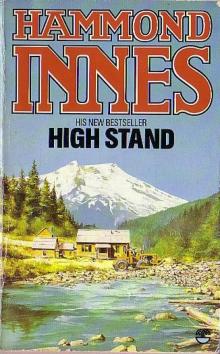 High Stand
High Stand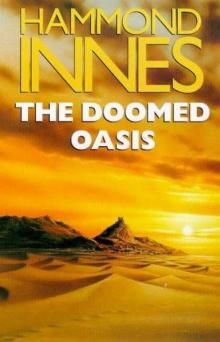 The Doomed Oasis
The Doomed Oasis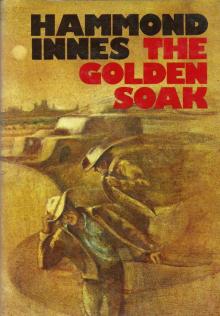 Golden Soak
Golden Soak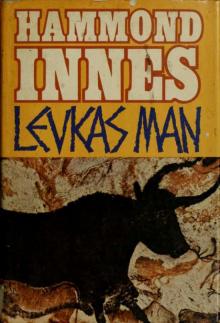 Levkas Man (Mystery)
Levkas Man (Mystery)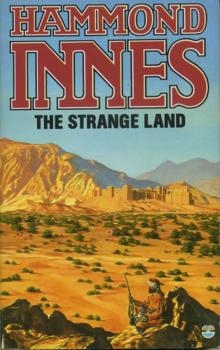 The Strange Land
The Strange Land Dead and Alive
Dead and Alive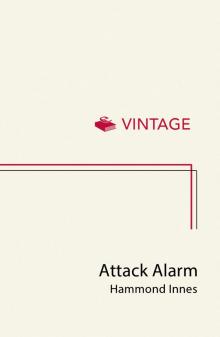 Attack Alarm
Attack Alarm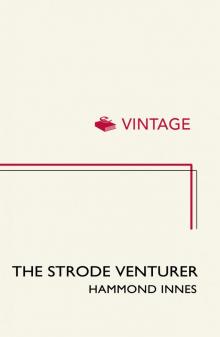 The Strode Venturer
The Strode Venturer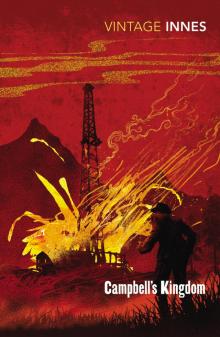 Campbell's Kingdom
Campbell's Kingdom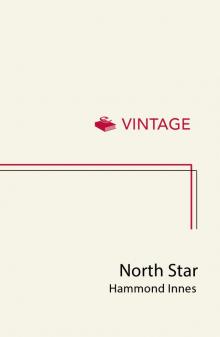 North Star
North Star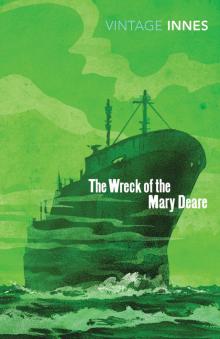 The Wreck of the Mary Deare
The Wreck of the Mary Deare The Lonely Skier
The Lonely Skier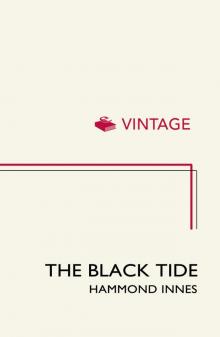 The Black Tide
The Black Tide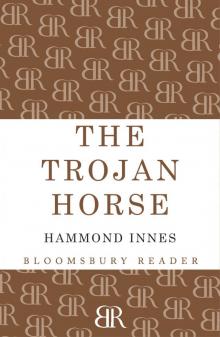 The Trojan Horse
The Trojan Horse Medusa
Medusa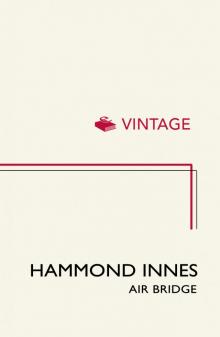 Air Bridge
Air Bridge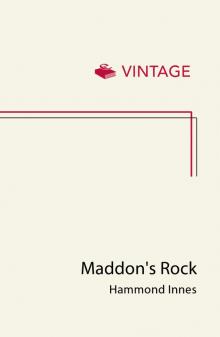 Maddon's Rock
Maddon's Rock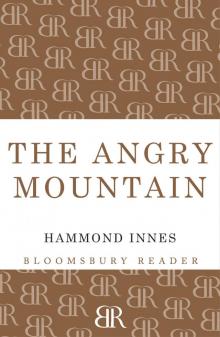 The Angry Mountain
The Angry Mountain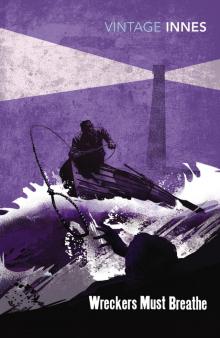 Wreckers Must Breathe
Wreckers Must Breathe Solomons Seal
Solomons Seal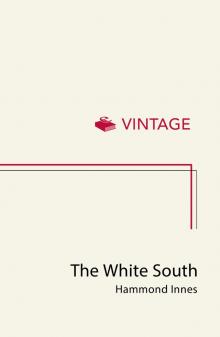 The White South
The White South